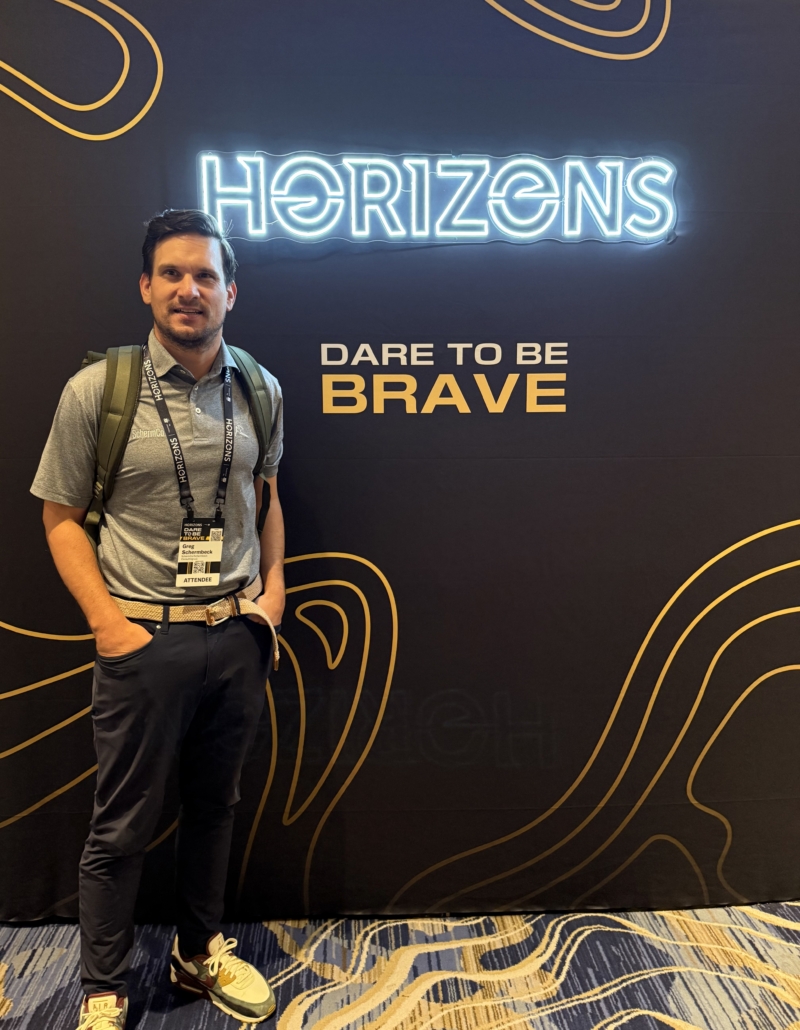#111 – 5 Key Insights from the Horizons Conference: How AI and Workforce Innovation Are Shaping Economic Mobility
Written by Greg Schermbeck
Founder & Principal, SchermCo
Founder & Board Chair, SchermCo Foundation
At SchermCo, we’re deeply committed to advancing economic mobility, modernizing workforce development, and helping communities thrive through strategic partnerships. Earlier this month, I had the privilege of attending the Horizons Conference in New Orleans, hosted by Jobs For The Future (JFF) —a national leader in building equitable economic advancement.
The event brought together innovators, funders, educators, and employers to explore the future of work and how AI, credentialing, and employer partnerships can transform lives. As a social-impact implementation firm, we are constantly exploring how we can apply these insights to strengthen outcomes for the communities and clients we serve.
We were especially proud to have previously hosted Maria Flynn, CEO of JFF, on our Square Pizza Podcast. One insight from our conversation continues to resonate:
“We’re really focused on creating equitable economic advancement for all. It’s not just about filling jobs—it’s about building systems that work for everyone.”
Here are five key takeaways from the Horizons Conference that every organization focused on social impact, education, and workforce equity should consider:
1. Workforce Development Requires Bold Investment and Employer Alignment
One of the strongest themes at Horizons was that workforce development is expensive—but necessary. Getting individuals from unemployment to career-ready status involves far more than just job placement. It requires sustained investment in digital literacy, transportation access, job coaching, and supportive services.
Major players are stepping up. Google, for example, has launched a $100 million workforce development fund and an Employer Consortium to ensure credential programs are aligned with real employer needs. This approach bridges the gap between education providers and high-demand industries, creating stronger, more sustainable career pathways.
2. Artificial Intelligence Will Reshape—Not Replace—Human Jobs
Rather than eliminating work, artificial intelligence (AI) is redefining how work gets done. At Horizons, the consensus was clear: AI will likely increase demand for new job categories—especially those related to infrastructure, maintenance, and human-machine collaboration.
Jobs in HVAC, data centers, smart building engineering, and electrician trades are expected to grow as AI systems become more embedded in our physical world. As one panelist framed it:
“This may be the last era for a human-only org chart.”
AI will also play a critical role in on-the-job learning, job matching, and rewriting job descriptions to better reflect actual workplace needs. These trends will require workforce partners to adapt quickly and integrate AI into everything from curriculum design to job placement.
3. Education Must Lead to Employment Outcomes
Traditional degree programs are being re-evaluated through a workforce lens. States and systems are beginning to phase out low-impact academic programs that do not align with labor market demand. In their place, institutions are investing in stackable credentials, industry-aligned certifications, and competency-based pathways.
Data-driven frameworks are helping connect learners to high-demand careers, ensuring education isn’t just a signal—but a bridge to economic mobility. These efforts are supported by tools like the SCORE Impact Credentials Framework, designed to promote stackability and transparency in credentialing.
4. Philanthropy Must Take Risks to Scale Workforce Innovation
Traditional philanthropy often shies away from bold bets. But in today’s economy, funders must act as risk capital for innovation—especially in the realm of AI and workforce equity. During the conference, leaders called on corporate and institutional funders to scale their impact by supporting experimental models that may not yet be “proven,” but are deeply promising.
Many CSR teams are now leveraging AI not just for internal operations, but to enhance their grantmaking and help grantees adopt data-driven tools. The future of philanthropy includes enabling nonprofits to explore AI ethically, equitably, and effectively.
As Maria Flynn said on our podcast:
“The philanthropic sector has an opportunity to fund innovation that might not succeed 100%—and that’s OK. We learn more from bold efforts than from safe bets.
5. AI Can Accelerate Economic Mobility—If Deployed Thoughtfully
One of the most exciting frontiers explored at Horizons is how AI can support economic mobility—particularly for historically underserved communities. Several organizations showcased AI tools that help individuals navigate job pathways, identify support services, and track educational progress across systems.
Despite the buzz around technology, the biggest barriers are still institutional and bureaucratic. Unlocking AI’s full potential in workforce development requires collaboration, shared data infrastructure, and a commitment to equity-centered design.
Our team sees major potential in helping partners deploy AI solutions for community impact, from data dashboards to predictive tools that inform strategy and investment.
Final Thoughts: SchermCo’s Role in the Future of Workforce Innovation
As a social impact firm focused on implementation, strategy, and equity, we are excited by the possibilities ahead. The Horizons conference affirmed our belief that partnerships, bold funding, and AI integration will define the next generation of workforce systems.
We’re committed to helping our partners—from schools to philanthropy to nonprofit leaders—navigate these shifts, build stronger programs, and create pathways to lasting opportunity.
Want to dive deeper into these conversations? Check out our full episode with Maria Flynn, CEO of JFF, on the Square Pizza Podcast – Episode 66.
Horizons – By The Numbers
- Bumped into five North Carolina friends
- Ran four miles
- Met one Square Pizza guest in-person
- Introduced to one fan of our work from Denver (thanks for the support!)


Leave a Reply
Want to join the discussion?Feel free to contribute!